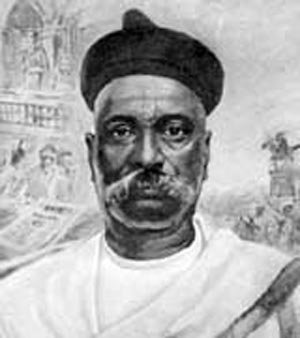
Bal Gangadhar Tilak, born July 22, 1856, was universally recognized as the Father of Indian Unrest. He was one of the prime architects of modern India and heralded Asian nationalism. His philosophy could not survive after his death as India came under sway of Mahatma Gandhi.
Tilak was a brilliant politician as well as a profound scholar who believed that independence is the foremost necessity for the well being of a nation and that to win it through extreme measures should not be dispensed with. He was the first intellectual leader to understand the importance of mass support and subsequently became the first mass leader of India. He realized that the constitutional agitation in itself was futile against the British and that, moreover, India was ill prepared for an armed revolt.
As a result, although he was helpful to revolutionaries such as Savarkar, Aurobindo Ghosh and Chaphekar, he did not venture into it himself. Instead, he martialled the extremist wing of Indian National Congress. His movement was based on the principles of Swadeshi (Indigenous), Boycott and Education. It was he who, through his own example, gave prestige to imprisonment in freedom struggle.
Tilak received Bachelor of Arts degree from The Deccan College, Pune in 1879 and L.L.B. from the Elphinston College, Mumbai in 1882. He was among the founders of the New English School, Pune (1881) of which Prof Chiplunkar became the Principal. He had a genius for organisation and with Agarkar, the then foremost social reformist, started the newspapers ‘Kesari’ and ‘The Maratha’ in 1881 and in 1890’s started the annual celebration of ‘Shivaji Festival’ and ‘Ganapati Festival’ which served a platform for people to join in the nationalist movement against the British. Soon he came to be regarded as the undisputed leader of Maharashtra and was honoured with the title ‘Lokamanya’ in 1893 which became synonymous with him in the 1900. As the nation fumed over the partition of Bengal (1905), Tilak assumed the national leadership with his extremist attitude and stated his position unequivocally as “Swarajya (self rule) is my birth right and I shall have it.”
The next three years saw meteoric rise in his stature and the British power which had long since considered him their chief concern and had sent him to prison twice already, decided on a firmer measure. Much has been said of his trial of 1908. He utilized his time in prison in scholarly pursuits and wrote ‘Gita Rahasya’, a commentary on the Gita. He returned to Indian political scene in 1915. The political situation was fast changing under the shadow of World War I. Mahatma Gandhi’s star was on rise with Satyagraha at Sabarmati in 1914.
The British charged Tilak in 1918. He fought those charges both in India and England, and was judged guilty. Amidst rumours of yet another sentence, he headed the Home-Rule commission in England to debate India’s constitutional demands. By that time, Gandhi had made preparations of the first nation wide non-cooperation movement.
The Lokamanya had no worthy successor. Aurobindo Ghosh had retired to an ascetic life and Savarkar was serving two life sentences in Andaman. Tilak’s health continued to deteriorate rapidly. At the end of July 1920 he went delirious and was unconscious for 3 days.”
At midnight on Aug 1, 1920, he was declared dead.
It is said that the British made an extraordinary request that his brain be handed over to them so that it could be studied, preserved and exhibited. It was not complied with.

